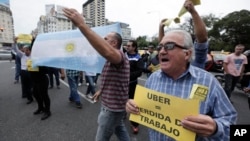Uber launched its service in Argentina's capital Tuesday in defiance of local authorities and despite road blocks set up by protesting taxi drivers that snarled traffic during the evening rush hour.
The company said more than 20,000 Uber drivers were now available in Buenos Aires. Uber said it will be successful because its prices are below tariffs regularly charged by local taxi drivers. It also said thousands of residents of Buenos Aires had already downloaded the ride-sharing app.
“I think it's very good that you can rate the drivers, it's cheaper than regular taxis and that there's no extra charges for carrying more luggage,'' said Leo Quintela, who signed up for the service and was looking at the app on his smartphone.
The Buenos Aires mayor's office has warned that Uber is not authorized to operate yet because it doesn't meet the requirements for transporting passengers.
“There's no way to guarantee the safety of passengers and the quality of the service,'' Juan Jose Mendez, the Buenos Aires transportation secretary, told reporters.
He warned that city inspectors might seize cars offering Uber's service.
Local cabbies blocked several streets and avenues in protests throughout Buenos Aires. Holding signs that read “Uber (equals) road insecurity,'' “Uber (equals) tax evasion'' and “Uber (equals) worsening work conditions,'' the taxi drivers said the service puts their livelihood at risk.
“Uber is tearing us in half,'' said Daniel Capella, who has been a cabbie for 23 years. “They're totally illegal because they're trampling on 38,000 taxi drivers who are paying passenger insurance and all the city requirements so we can work legally.''
Uber began in 2009 and is now operating in 64 countries. Its drivers have previously faced angry protests in Mexico City, Paris and other cities.




